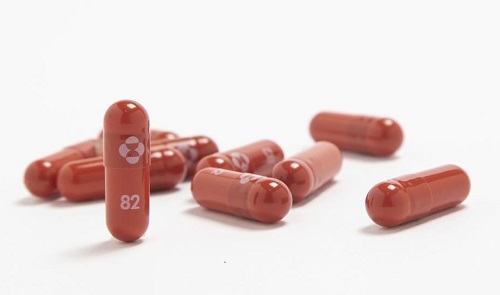
October 1, 2021 – Merck announced today that its experimental COVID-19 pill reduced hospitalizations and deaths by half in people recently infected with the coronavirus and that it would soon ask health officials in the U.S. and around the world to authorize its use.
If cleared, the drug would be the first pill shown to treat COVID-19, a potentially major advance in efforts to fight the pandemic, as all COVID-19 therapies currently authorized in the U.S. require an IV or injection, the Associated Press reports.
Merck and its partner Ridgeback Biotherapeutics said early results showed patients who received the drug, called molnupiravir, within five days of COVID-19 symptoms had about half the rate of hospitalization and death as patients who received a placebo.
An independent group of medical experts monitoring the trial reportedly saw such strongly positive results that they deemed it unethical to continue giving people the placebo and stopped the study early. That is typical when early results so clearly show a treatment works that there is no need for further testing before applying for authorization.
“We always believed antivirals, especially an oral antiviral, would be an important contribution to the pandemic,” Daria Hazuda, VP of infectious diseases and vaccine discovery at Merck, told The Washington Post. “Keeping people out of the hospital is incredibly important, given the emergence of variants and the continued evolution of the virus.”
The emergence of an oral treatment for COVID-19 could prove to be an effective method of treatment for parts of the globe that have less access to a COVID vaccination. Further lab experiments and animal testing suggest that molnupiravir might be effective against the Delta variant and other variants. The pill introduces genetic errors that confuses the genetic code of the coronavirus. It might even be more resistant to mutation and may treat other coronaviruses or RNA viruses.
Hazuda said, “As a virologist, that’s one of the things I find particularly exciting. Now, we’ve demonstrated the potential to have a drug that could work across multiple coronaviruses. I don’t think this is the last pandemic in our lifetime, and having something readily available that is active would be amazing.”
Earlier study results showed the drug did not benefit patients who were already hospitalized with severe disease. Disease experts agree that prevention – in the form of vaccinations – is still the most effective way to bring the pandemic to an end. Widespread vaccinations are proven to reduce severe cases and hospitalizations and therefore lighten the strain on a health system that is at its breaking point in many places.
Merck plans to submit the data for FDA review in coming days. Once the submission is complete, the FDA could make a decision within weeks — and the drug would be on the market soon after.
The U.S. government has committed to purchase 1.7 million doses of the drug if it is authorized by the FDA. Merck has said it can produce 10 million doses by the end of the year and has contracts with governments worldwide. The company has not announced prices.
Because of the low accessibility to the vaccine and high cost of the monoclonal antibody treatment, Merck says it will strive to provide better global accessibility to molnupiravir and will implement a tier pricing approach “based on World Bank country income criteria to reflect countries’ relative ability to finance their health response to the pandemic.”
Learn More
*Story updated at 12:48 p.m., October 1, 2021
